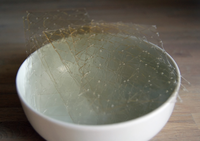
Photo from wikipedia
Abstract Hydrogels are commonly used as scaffolds for the preparation of three-dimensional tissue constructs and for the encapsulation and delivery of cells in regenerative medicine. Polyesters are an attractive class… Click to show full abstract
Abstract Hydrogels are commonly used as scaffolds for the preparation of three-dimensional tissue constructs and for the encapsulation and delivery of cells in regenerative medicine. Polyesters are an attractive class of polymers for hydrogel preparation. However, most polyesters have hydrophobic backbones and lack pendent groups that can be chemically functionalized. We describe here the development of water-soluble polyesters based on aspartic acid and poly(ethylene glycol) (PEG) (600 or 1500 g/mol), having pendent reactive amines. The reactivity of these amines with methacrylic anhydride, maleic anhydride, and itaconic anhydride was explored for the introduction of crosslinkable groups. The resulting methacrylamide-functionalized polymers were successfully crosslinked to form hydrogels using a redox-initiated free radical polymerization. The use of 10% (weight/volume) of polymer, and 10 mM of potassium persulfate and tetramethylethylenediamine led to high (> 97%) gel content, and compressive moduli of 13 – 21 kPa. Human adipose-derived stromal cells were encapsulated during the crosslinking process and exhibited greater than 80% viability in the hydrogels prepared from the polyester containing 600 g/mol PEG, with lower viability observed for the polymer containing 1500 g/mol PEG. These results support the potential for aspartic acid-based copolymers with short PEG chains in the backbone to serve as a platform for cell encapsulation, with additional opportunities for further functionalization available in the future.
Journal Title: European Polymer Journal
Year Published: 2021
Link to full text (if available)
Share on Social Media: Sign Up to like & get
recommendations!